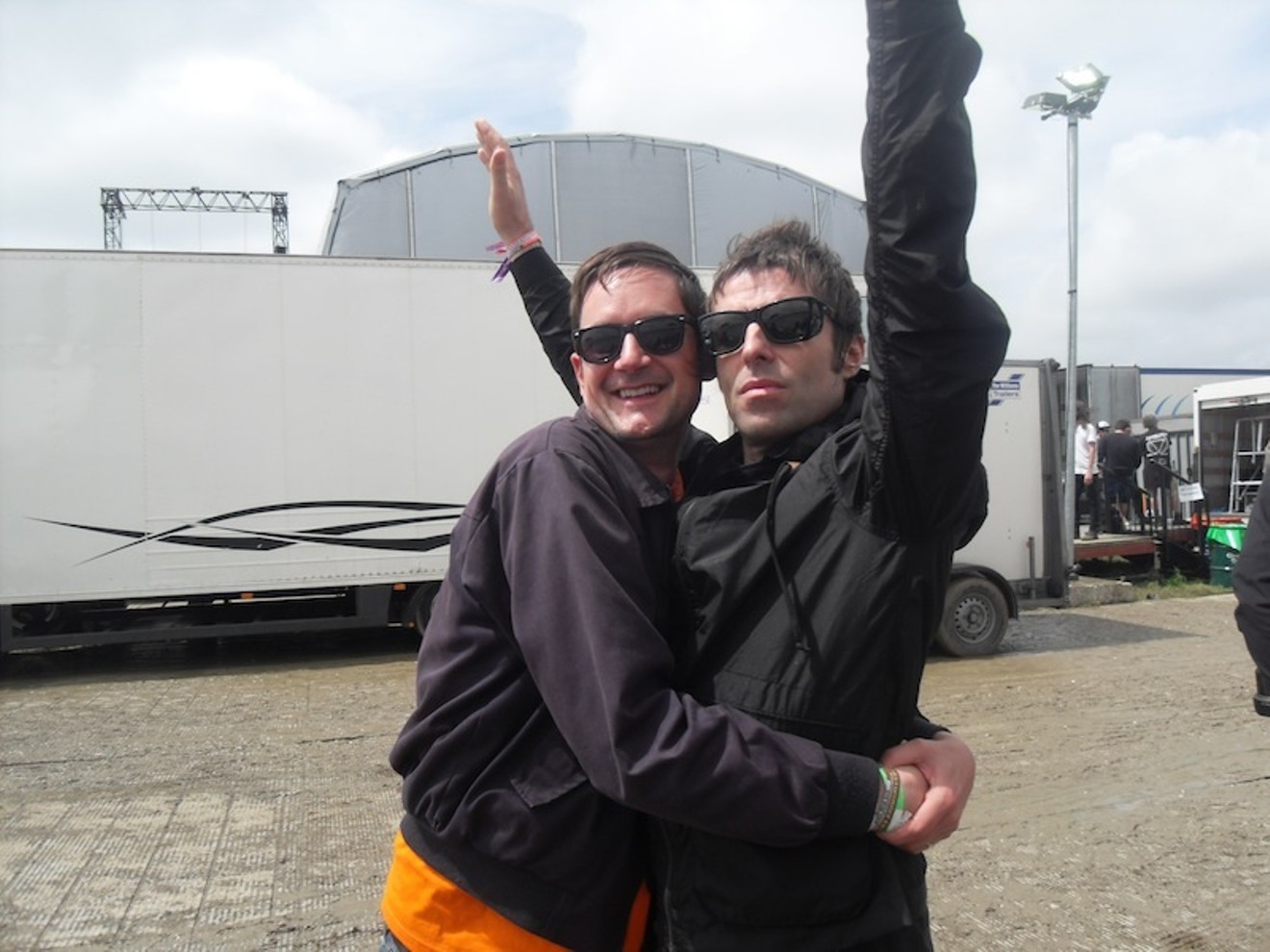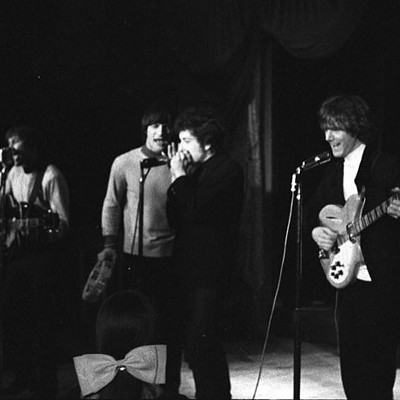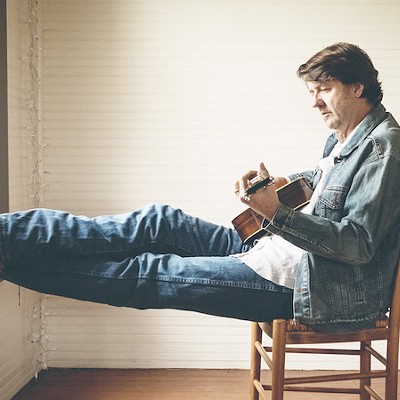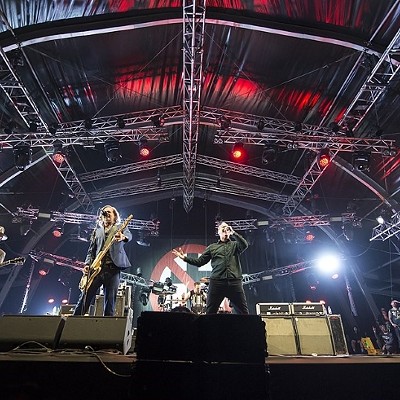I was listening to Oasis’s Be Here Now the other day, if for no other reason than that I’ve been on a '90s kick lately, and it could be argued that Oasis was (at least for a while) the biggest band of the '90s. Plus, Oasis was a legitimately good pop-rock band in an era littered with quality pop-rock bands.
This inevitably led to me reading up on the album – old reviews, thoughts from the brothers Gallagher, etc. Of course, as it often does in various online pursuits, this also took me to Be Here Now’s Wikipedia page, which revealed something I hadn’t yet realized – namely, the album was released 20 years ago this month.
But this isn’t some 20-year retrospective designed to provide full insight on a particular band and album, what the latter meant to the former, and what the former meant to the music-buying public at large. Rather, this is simply an accidentally-stumbled-upon defense of one of the more misunderstood records of the '90s, a record that really had no chance before it was ever recorded, and sure as hell didn’t have a chance after it was released.
Be Here Now, released August 21, 1997, was Oasis’s third studio album. It followed 1994’s Definitely Maybe, which broke the band into the mainstream, and 1995’s (What’s the Story) Morning Glory?, which vaulted Oasis to the top of the pop-rock consciousness and launched its very own sub-era – the Brit-rock craze. These are universally regarded as Oasis’s two best albums, which makes sense, since they are Oasis’s two best albums. And this is pretty much why Be Here Now never stood a chance.
By the time Oasis set into the studio in the fall of 1996 to record Be Here Now, they were megastars in both the U.S. and their native U.K. Allow guitarist Noel Gallagher – one half of the Gallagher brothers, who would make fine cartoon characters if not for the fact that the pair actually exists – to explain where the band stood in the pop lexicon after the release of its first two records: “The biggest band in the world...bigger than, dare I say it, fucking God.”
Just Wednesday, Liam made waves in an interview with Noisey, in which he dropped the F-word more than 100 times and explained why he has gone solo: "For me to go and get another band back together it'd only be compared to Oasis anyway, so what's the fuckin' point?" Seriously, check out the whole interview; it's worth your time.
If there were three things the brothers Gallagher (Liam being the other) were known for in the mid-'90s, they were fighting among themselves; a total and utter lack of humility; and the ability to make some of the catchiest tunes ever released to rock radio. This explains why Definitely Maybe sold more than 15 million albums on the strengths of singles like “Live Forever” and “Cigarettes & Alcohol,” only for What’s the Story? to come along a year later and hit No. 1 on pretty much every album-sales chart in the world. It did so by featuring smash singles like “Wonderwall” and “Don’t Look Back In Anger,” both of which receive ample radio play to this day.
So it was understandable that critics and audiences alike weren’t exactly kind to Be Here Now upon its release in the summer of 1997. After all, it didn’t quite reach the heights of its predecessors, and while its singles were certainly high in quality, they paled in comparison to the reach of “Wonderwall” and “Don’t Look Back in Anger.” But, damn, people really went all-in on Be Here Now.
Rolling Stone called it the “Ozymandias-size monument to rock-star folly – the kind of studio monstrosity that just can't happen without a rare cosmic convergence of money, ego, hostility, dripping nostrils and guitar overdubs.” Pitchfork called it “bloated and indulgent." Hell, Noel Gallagher himself called the album bland and some of its tracks “fucking shit.”
These naysayers are all wrong. Not only is Be Here Now far better than it was credited upon release some 20 years ago, it’s actually, gulp, a pretty great record. Four of the album’s 12 tracks ended up singles, and all four – “Stand by Me,” “All Around the World,” “D’You Know What I Mean?” and “Don’t Go Away” — are all solid and catchy and mostly suffered on the radio charts because they didn’t fit the standard sub-four-minute mind-set. Other tracks, like “I Hope, I Think, I Know” and “Fade In-Out,” only add to an album that did eventually go on to sell more than 8 million copies worldwide.
Now, to be fair, Be Here Now is a bloated record. Even Liam Gallagher, a defender of Be Here Now, has since admitted that the album is “just a little bit long.” Not that this is some sort of cardinal sin as it pertains to music. In fact, some of my favorite albums in recent years (Drake’s Views and Kendrick Lamar’s To Pimp a Butterfly, to name a couple) run well north of an hour.
And sure, Oasis kinda set itself up for a backlash. The band, particularly the brothers Gallagher, were pompous, drug-fueled jerks who essentially begged for comeuppance. It didn’t help that the band’s label limited pre-release radio play and made journalists sign gag orders regarding advance coverage and reviews; this was back when the press had a little more control on music’s overall narrative. In short, Be Here Now would have still had its detractors had it been Revolver or Blonde on Blonde.
Twenty years later, no one much thinks of Oasis anymore. The band went from releasing a record like Be Here Now, which was viewed as bad but is an album that's actually quite good, to releasing albums like Heathen Chemistry and Don’t Believe the Truth. These are not misunderstood albums, but rather albums that are correctly defined as mediocre.
At least in the U.S., Oasis is a mere footnote in the annals of pop music, a band that produced a few popular songs but was inevitably done in by its own excess. To an extent this is true, and perhaps it was Be Here Now that began Oasis’s descent into mediocrity. But to call Be Here Now a bad record is unfair to a band that made a far larger imprint than some might care to remember.
Support Us
Houston's independent source of
local news and culture
account
- Welcome,
Insider - Login
- My Account
- My Newsletters
- Contribute
- Contact Us
- Sign out

Liam Gallagher (right) and Oasis don't get the credit they deserve for Be Here Now.
Photo courtesy of Worthy FM via Flickr Commons
[
{
"name": "Related Stories / Support Us Combo",
"component": "11591218",
"insertPoint": "4",
"requiredCountToDisplay": "4"
},{
"name": "Air - Billboard - Inline Content",
"component": "11591214",
"insertPoint": "2/3",
"requiredCountToDisplay": "7"
},{
"name": "R1 - Beta - Mobile Only",
"component": "12287027",
"insertPoint": "8",
"requiredCountToDisplay": "8"
},{
"name": "Air - MediumRectangle - Inline Content - Mobile Display Size 2",
"component": "11591215",
"insertPoint": "12",
"requiredCountToDisplay": "12"
},{
"name": "Air - MediumRectangle - Inline Content - Mobile Display Size 2",
"component": "11591215",
"insertPoint": "4th",
"startingPoint": "16",
"requiredCountToDisplay": "12"
}
,{
"name": "RevContent - In Article",
"component": "12527128",
"insertPoint": "3/5",
"requiredCountToDisplay": "5"
}
]
KEEP THE HOUSTON PRESS FREE...
Since we started the Houston Press, it has been defined as the free, independent voice of Houston, and we'd like to keep it that way. With local media under siege, it's more important than ever for us to rally support behind funding our local journalism. You can help by participating in our "I Support" program, allowing us to keep offering readers access to our incisive coverage of local news, food and culture with no paywalls.
Clint Hale enjoys music and writing, so that kinda works out. He likes small dogs and the Dallas Cowboys, as you can probably tell. Clint has been writing for the Houston Press since April 2016.
Contact:
Clint Hale
Trending Music
- Country Rock Thrives with Gene Clark and Flying Burrito Brothers for Record Store Day
- Bruce Robison Is The Eternal Song Hunter
- Low Cut Connie Keeps One Foot In The Gutter
-
Sponsored Content From: [%sponsoredBy%]
[%title%]

Don't Miss Out
SIGN UP for the latest
Music
news, free stuff and more!
Become a member to support the independent voice of Houston
and help keep the future of the Houston Press FREE
Use of this website constitutes acceptance of our
terms of use,
our cookies policy, and our
privacy policy
The Houston Press may earn a portion of sales from products & services purchased through links on our site from our
affiliate partners.
©2024
Houston Press, LP. All rights reserved.





